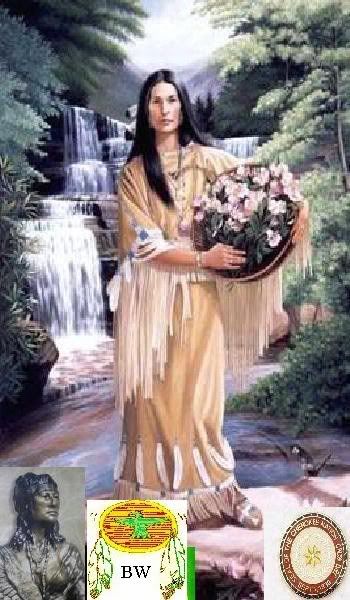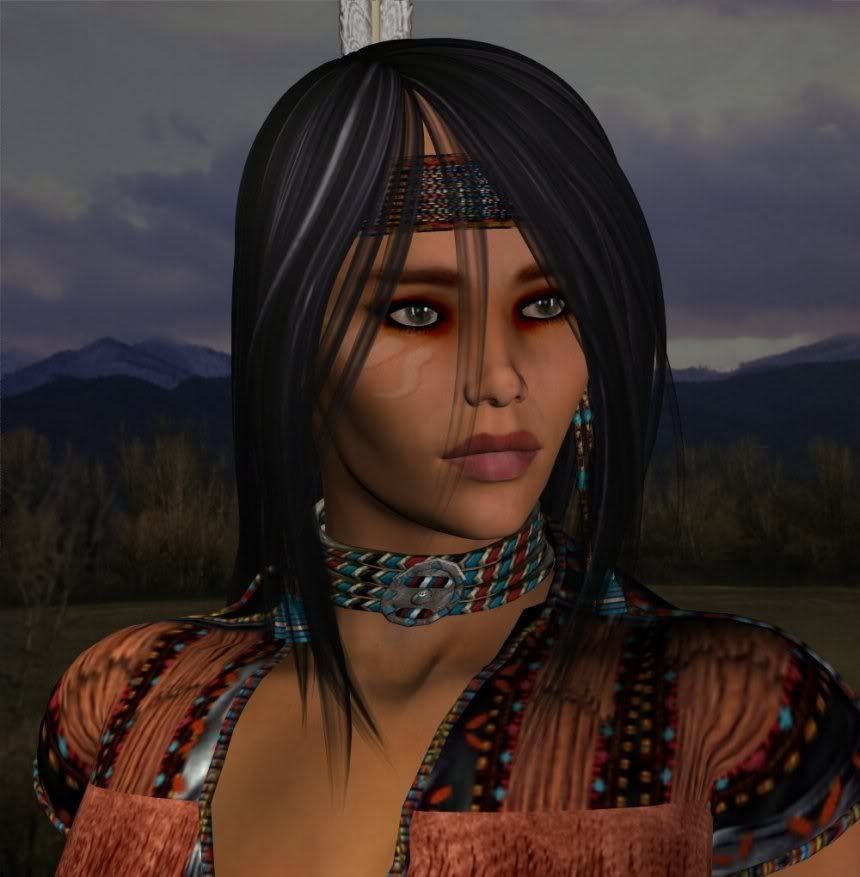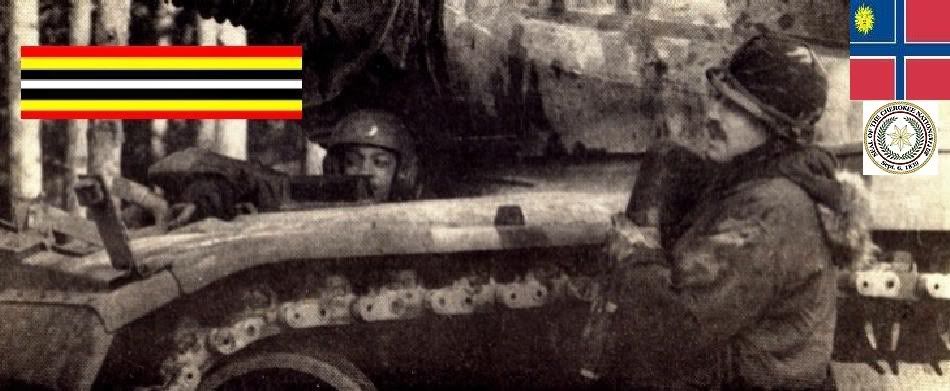|

Nancy Ward
Warriors Citation
When she died "a light rose from her body, fluttered around the room like a bird, left through an open door and disappeared
toward Chota. This was watched by those in attendance who were startled at this apparition." This statement made by her great-grandson,
John Walker "Jack" Hildebrand (1818-1910) in 1908, is part of the legend of Nancy Ward, a full-blood Native American who rose
to prominence in the tribe during war with the Creeks and whose assistance to settlers in Tennessee made her a popular figure.
Dr. Emmet Starr (1870-1930), Cherokee physician, descended from Nancy Ward through both his father and mother, did a study
of her life and descendants in the 1890's and early 1900's. Dr. Starr felt that her name was originally "Na-na" or "No-na"
and figured her year of birth as 1695. This date was supposed to have been computed from the knowledge that she was twelve
years old when William Penn made a treaty, probably with the Delaware tribe; however the exact treaty referred to is not known.
We now believe that 1738 is more nearly correct year. Muriel Wright, in Springplace, Moravian Mission, Cherokee Nation, gives
her name as "Nanye'hi." In any case it is not difficult to anglicize either of these to Nancy. She was born at Chota, a capital
of the Cherokee Nation since 1730, now in Monroe County, Tennessee. She was a member of the Wolf Clan and came from an important
family in Cherokee politics. Her mother's adopted brother was Attacullaculla (also called "Little Carpenter"), who visited
London in 1730 as a young man. Today, Nancy's mother is usually called "Tame Doe," but this name surely came from the fictional
account of Nancy's life written by E. Sterling King in 1895, entitled The Wild Rose of the Cherokee, or, Nancy Ward, the Pocahontas
of the West; no historical sources giving this name are known. According to Jack Hilderbrand, Nancy's father was a member
of the Delaware tribe, historically related to the Cherokee; it is possible he may have been related to the famous Delaware
Chief Taminand. About 1751, Nancy married a Cherokee warrior named "Tsu-la" or Kingfisher. While nothing is known about his
family, he was a member of the Deer Clan, according to Emmet Starr, and likely held the potential for a high position in Cherokee
politics.

Nancy first became prominent in Cherokee affairs about 1755 during a battle with the Muskogee (Creek) Indians. The Cherokee
and the Muskogee had waged a heredity war for possession of what is now northern Georgia for many years. According to James
Mooney, the battle of Taliwa was fought at a spot on Mountain Creek or Long-swamp Creek, which enters the Etowah River near
present-day Ball Ground, Georgia, in Cherokee County. James Wafford is supposed to have heard the story from the aged trader
Bryan Ward about 1815, who is said to have witnessed the battle. Five hundred Cherokee warriors and about twice that number
of Muskogee were engaged. The Cherokee, at first, fell back, but rallied and drove the Muskogee from their cover. The defeat
was so great that the Creeks left the upper portion of Georgia and the adjacent part of Alabama and never returned. According
to Dr. Starr, Nancy had accompanied Kingfisher to the battle, lying behind a log in order to chew his bullets so that the
resulting jagged edges might create more damage. Kingfisher was killed, and Nancy picked up his rifle and continued the fight.
For her valor, she was awarded some of the spoils of war, including captured slaves. Dr. Starr states that she thus became
the first slaveholder among the Cherokee, but this seems doubtful. In addition, Nancy was awarded the title of “War
Woman.” Sometime later, just when is not known, she was given a title which Dr. Starr calls "Ghi-ga-u" and has been
translated as "Beloved Woman," sometimes as "Most Honored Woman." Holders of this title had a right to speak and vote at Cherokee
Councils and had supreme pardoning power; both rights Nancy used through most of the remainder of her life. A few years after
Kingfisher's death, Nancy married again to the trader, Bryan Ward. Dr. Starr says that he came from Ireland, had been married
previously and was the father of a son John "Jack" Ward who came into the Cherokee country and became the ancestor of a large
family. Dr. Starr also indicated that Bryan died within a few years of his marriage to Nancy. Current research calls these
beliefs into question. It appears probable that this is the same Bryan Ward who died about 1815 in Franklin County, Georgia.
Other research is also calling into question whether Bryan was born in Ireland, but rather may have come from a family of
Wards who had been in Virginia for many generations. Nancy and Bryan were the parents of one daughter, Betsy, who was the
Cherokee wife of General Joseph Martin of Virginia while he lived with the tribe. During the 1760's many white settlers from
the Carolinas, Virginia and Georgia began to move into the East Tennessee region along the Watauga River basin and in 1772
a group of these settlers met with Nancy's uncle, Chief Attakullakulla, in order to work out details of a lease and friendship
pact. The agreement was a ten-year permit for which the Cherokee received the equivalent of a thousand dollars of trading
goods and the promise not to encroach further on the Cherokee Overmountain country. There were several instances of skirmishes
between the Cherokee and the white settlers over the next few years including one time in 1774 when a cousin of Chief Ostenaco
was murdered. The whites, afraid of retaliation, asked James Robertson to serve as peacemaker, and he made a journey to Chota
in order to apologize to the Cherokee and promise punishment for the murderer. It is thought that Robertson may have visited
Nancy Ward during this trip. He later described Nancy as "queenly and commanding" and noted that her home was furnished in
"barbaric splendor as befitted her rank in the nation." During the next two years many white settlers moved into the Cherokee
domain and some of the younger Cherokee leaders, including Attakullakulla's son, Dragging Canoe, began to discuss options
of removing them by force. War parties were convened in July, 1776. Nancy sent four white traders, led by Isaac Thomas, to
warn the Overmountain settlements. Why Nancy would warn white settlers against her own people is conjecture, but she is supposed
to have later said "the white men are our brothers. The same house shelters us and the same sky covers us all." In July, 1776,
Cherokee warriors were divided into three groups led by Dragging Canoe, The Raven of Chota, and Old Abram; they attacked white
settlements. The group led by Old Abram captured two whites, Samuel Moore and Mrs. William (Lydia Russell) Bean. Moore was
later burned at the stake, and Mrs. Bean was taken to a town called Toque, near Chota, where she was to have suffered the
same fate. However, Nancy appeared after she had been bound and demanded that Mrs. Bean be freed. She told the warriors, "it
revolts my soul that Cherokee warriors would stoop so low as to torture a squaw. No woman shall be tortured or burned at the
stake while I am 'Ghi-ga-u'." Mrs. Bean was taken to Nancy's home in Chota where she taught Nancy and members of her family
how to make butter and cheese. Later Nancy sent Lydia Bean back to her family accompanied by Nancy's brother, Longfellow,
and her son, Fivekiller. It has been indicated that John Bean, who married Nancy's great granddaughter, Ruth Starr, was a
grandson of Lydia and William Bean, but no proof has been found. The Cherokee raid on the white settlements was unsuccessful,
and there followed several years of disagreements among different factions of the tribe on how to deal with the whites. In
1785 at Hopewell, South Carolina, the new U. S. government and the Cherokee agreed to a treaty the last clause of which stated:
"Any settler who fails to remove within six months from the land guaranteed to the Indians shall forfeit the protection of
the United States, and the Cherokee may punish him or not as they please." At the signing, Nancy Ward spoke: "I am glad there
is now peace, I take you by the hand in real friendship. I have a pipe and a little tobacco to give the commissioners to smoke
in friendship. I look on you and the red people as my children. Your having determined on peace is most pleasant to me for
I have seen much trouble during the late war. I am old, but I hope yet to bear children who will grow up and people our Nation,
as we are now under the protection of Congress and shall have no more disturbances. The talk I have given you is from the
young warriors I have raised in my town, as well as myself. They rejoice that we have peace, and hope the chain of friendship
will never more be broken." Nancy delivered two strings of wampum, a pipe and some tobacco to the white commissioners. During
the 1790s a glimpse of Nancy Ward comes from William Martin, white son of General Joseph Martin whose Cherokee wife was Nancy's
daughter, Betsy: "When I lived in South Carolina (1791-1798) Bryant Ward, then old, sensible and intelligent, lived as my
neighbor--was settled and had a family. He had, in early life, been a trader among the Cherokee. He took a wife there, the
notorious Nancy Ward...she was, as I think, one of the most superior women I ever saw. Bryant Ward and his family recognized
her, for I have frequently seen her there, we then living not far from the Cherokee settlements." There is a probable mention
of Nancy in the Diary of the Missionaries to Springplace with the date 5 July 1807: "Gambold went to see the ailing Mrs. Vann.
While there three old Indian women came to see her. They were from Ostenali and were very friendly and talkative. One of them,
who had been a widow for 50 years, was 100 years of age. They said that they loved the whites and when Col. Meigs came to
Ostenali he stayed with the aged widow. Mrs. Vann told them why we were here as she grasped and clenched Sr. Gambold's hand
and held it tightly. She told them that she loved us very much. The aged woman, named Chicouehla, claimed that she had in
her youth gone to war against hostile Indians and suffered several severe wounds. Vann's wives verified this and said that
she was highly respected and loved by browns and whites alike. Her left arm was covered with figures, which she said was the
custom in her youth...According to Chicouehla's promise, she returned the next day and attended the entire session of school,
and the children did the best to interpret for her." In 1817 Nancy and several other Cherokee women including her daughter,
Katy Harlan, presented a memorial to the Cherokee delegates requesting that this be the final cession of Cherokee lands to
the U. S. As a result of that treaty, Nancy requested a life reservation of 640 acres of land in part of the ceded territory,
but according to testimony given later by her heirs, she became afraid to live there and returned to the Cherokee Nation.
In 1819 the Cherokee Nation enacted a Constitution, and Nancy, who had a voice and vote at Cherokee councils, sent her walking
stick and her vote in favor of ratification, she being too old and feeble to attend in person. She thereby relinquished any
power she had as "Ghi-ga-u" since there was no constitutional authority for that office. In her last years Nancy operated
an inn at the Womankiller Ford of the Ocoee River in present-day Polk County, Tennessee, near Benton. It was there that she
died, in spring of 1824 according to Emmet Starr, but other sources list the year as 1822. She was buried on a small hill
nearby, and rests between her brother, Longfellow, and her son, Fivekiller. It is likely that the location was preserved by
Jack Hilderbrand, who lived in the area after the Cherokee removal. Her grave was marked by the Nancy Ward Chapter of the
Daughters of the American Revolution in 1924 and is preserved today by the State of Tennessee. In 1994 her descendants organized
to form The Association of the Descendants of Nancy Ward. From: historical accounts & records


LINK TO BRAVEHORSE WARRIORS VOLUME TWO
|

